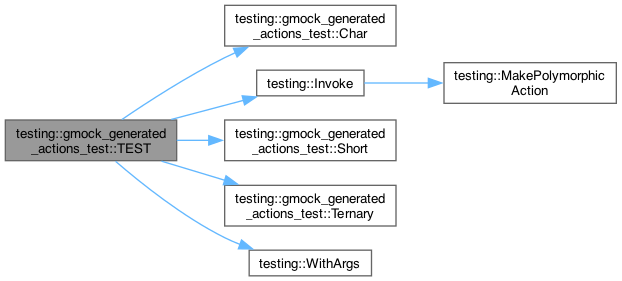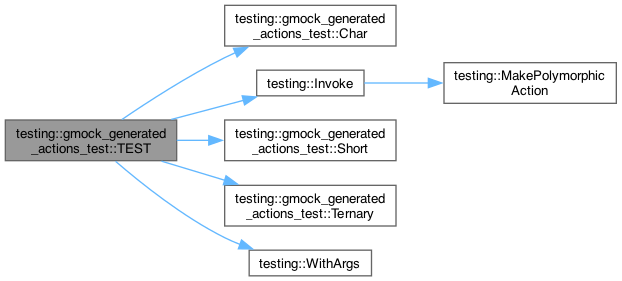Namespaces | |
| namespace | action_test |
Classes | |
| class | BoolResetter |
| struct | GiantTemplate |
| class | NullaryConstructorClass |
| class | NullaryFunctor |
| class | SubstractAction |
| struct | SumOf5Functor |
| struct | SumOf6Functor |
| class | TenArgConstructorClass |
| class | UnaryConstructorClass |
| struct | UnaryFunctor |
Functions | |
| short | Short (short n) |
| char | Char (char ch) |
| int | Nullary () |
| bool | Unary (int x) |
| const char * | Plus1 (const char *s) |
| bool | ByConstRef (const std::string &s) |
| bool | ReferencesGlobalDouble (const double &x) |
| std::string | ByNonConstRef (std::string &s) |
| const char * | Binary (const char *input, short n) |
| void | VoidBinary (int, char) |
| int | Ternary (int x, char y, short z) |
| void | VoidTernary (int, char, bool) |
| int | SumOf4 (int a, int b, int c, int d) |
| std::string | Concat4 (const char *s1, const char *s2, const char *s3, const char *s4) |
| int | SumOf5 (int a, int b, int c, int d, int e) |
| std::string | Concat5 (const char *s1, const char *s2, const char *s3, const char *s4, const char *s5) |
| int | SumOf6 (int a, int b, int c, int d, int e, int f) |
| std::string | Concat6 (const char *s1, const char *s2, const char *s3, const char *s4, const char *s5, const char *s6) |
| std::string | Concat7 (const char *s1, const char *s2, const char *s3, const char *s4, const char *s5, const char *s6, const char *s7) |
| std::string | Concat8 (const char *s1, const char *s2, const char *s3, const char *s4, const char *s5, const char *s6, const char *s7, const char *s8) |
| std::string | Concat9 (const char *s1, const char *s2, const char *s3, const char *s4, const char *s5, const char *s6, const char *s7, const char *s8, const char *s9) |
| std::string | Concat10 (const char *s1, const char *s2, const char *s3, const char *s4, const char *s5, const char *s6, const char *s7, const char *s8, const char *s9, const char *s10) |
| const char * | CharPtr (const char *s) |
| TEST (InvokeArgumentTest, Function0) | |
| TEST (InvokeArgumentTest, Functor1) | |
| TEST (InvokeArgumentTest, Function5) | |
| TEST (InvokeArgumentTest, Functor5) | |
| TEST (InvokeArgumentTest, Function6) | |
| TEST (InvokeArgumentTest, Functor6) | |
| TEST (InvokeArgumentTest, Function7) | |
| TEST (InvokeArgumentTest, Function8) | |
| TEST (InvokeArgumentTest, Function9) | |
| TEST (InvokeArgumentTest, Function10) | |
| TEST (InvokeArgumentTest, ByPointerFunction) | |
| TEST (InvokeArgumentTest, FunctionWithCStringLiteral) | |
| TEST (InvokeArgumentTest, ByConstReferenceFunction) | |
| TEST (InvokeArgumentTest, ByExplicitConstReferenceFunction) | |
| TEST (WithArgsTest, OneArg) | |
| TEST (WithArgsTest, TwoArgs) | |
| TEST (WithArgsTest, ThreeArgs) | |
| TEST (WithArgsTest, FourArgs) | |
| TEST (WithArgsTest, FiveArgs) | |
| TEST (WithArgsTest, SixArgs) | |
| TEST (WithArgsTest, SevenArgs) | |
| TEST (WithArgsTest, EightArgs) | |
| TEST (WithArgsTest, NineArgs) | |
| TEST (WithArgsTest, TenArgs) | |
| TEST (WithArgsTest, NonInvokeAction) | |
| TEST (WithArgsTest, Identity) | |
| TEST (WithArgsTest, RepeatedArguments) | |
| TEST (WithArgsTest, ReversedArgumentOrder) | |
| TEST (WithArgsTest, ArgsOfCompatibleTypes) | |
| TEST (WithArgsTest, VoidAction) | |
| TEST (DoAllTest, TwoActions) | |
| TEST (DoAllTest, ThreeActions) | |
| TEST (DoAllTest, FourActions) | |
| TEST (DoAllTest, FiveActions) | |
| TEST (DoAllTest, SixActions) | |
| TEST (DoAllTest, SevenActions) | |
| TEST (DoAllTest, EightActions) | |
| TEST (DoAllTest, NineActions) | |
| TEST (DoAllTest, TenActions) | |
| ACTION (Return5) | |
| TEST (ActionMacroTest, WorksWhenNotReferencingArguments) | |
| ACTION (IncrementArg1) | |
| TEST (ActionMacroTest, WorksWhenReturningVoid) | |
| ACTION (IncrementArg2) | |
| TEST (ActionMacroTest, CanReferenceArgumentType) | |
| ACTION (Sum2) | |
| TEST (ActionMacroTest, CanReferenceArgumentTuple) | |
| int | Dummy (bool flag) |
| ACTION (InvokeDummy) | |
| TEST (ActionMacroTest, CanReferenceMockFunctionType) | |
| ACTION (InvokeDummy2) | |
| TEST (ActionMacroTest, CanReferenceMockFunctionReturnType) | |
| ACTION (ReturnAddrOfConstBoolReferenceArg) | |
| TEST (ActionMacroTest, WorksForConstReferenceArg) | |
| ACTION (ReturnAddrOfIntReferenceArg) | |
| TEST (ActionMacroTest, WorksForNonConstReferenceArg) | |
| TEST (ActionMacroTest, WorksInNamespace) | |
| ACTION (PlusTwo) | |
| TEST (ActionMacroTest, WorksForDifferentArgumentNumbers) | |
| ACTION_P (Plus, n) | |
| TEST (ActionPMacroTest, DefinesParameterizedAction) | |
| ACTION_P (TypedPlus, n) | |
| TEST (ActionPMacroTest, CanReferenceArgumentAndParameterTypes) | |
| TEST (ActionPMacroTest, WorksInCompatibleMockFunction) | |
| ACTION (OverloadedAction) | |
| ACTION_P (OverloadedAction, default_value) | |
| ACTION_P2 (OverloadedAction, true_value, false_value) | |
| TEST (ActionMacroTest, CanDefineOverloadedActions) | |
| ACTION_P3 (Plus, m, n, k) | |
| TEST (ActionPnMacroTest, WorksFor3Parameters) | |
| ACTION_P4 (Plus, p0, p1, p2, p3) | |
| TEST (ActionPnMacroTest, WorksFor4Parameters) | |
| ACTION_P5 (Plus, p0, p1, p2, p3, p4) | |
| TEST (ActionPnMacroTest, WorksFor5Parameters) | |
| ACTION_P6 (Plus, p0, p1, p2, p3, p4, p5) | |
| TEST (ActionPnMacroTest, WorksFor6Parameters) | |
| ACTION_P7 (Plus, p0, p1, p2, p3, p4, p5, p6) | |
| TEST (ActionPnMacroTest, WorksFor7Parameters) | |
| ACTION_P8 (Plus, p0, p1, p2, p3, p4, p5, p6, p7) | |
| TEST (ActionPnMacroTest, WorksFor8Parameters) | |
| ACTION_P9 (Plus, p0, p1, p2, p3, p4, p5, p6, p7, p8) | |
| TEST (ActionPnMacroTest, WorksFor9Parameters) | |
| ACTION_P10 (Plus, p0, p1, p2, p3, p4, p5, p6, p7, p8, last_param) | |
| TEST (ActionPnMacroTest, WorksFor10Parameters) | |
| ACTION_P2 (PadArgument, prefix, suffix) | |
| TEST (ActionPnMacroTest, SimpleTypePromotion) | |
| ACTION_P3 (ConcatImpl, a, b, c) | |
| template<typename T1 , typename T2 > | |
| ConcatImplActionP3< std::string, T1, T2 > | Concat (const std::string &a, T1 b, T2 c) |
| template<typename T1 , typename T2 > | |
| ConcatImplActionP3< T1, int, T2 > | Concat (T1 a, int b, T2 c) |
| TEST (ActionPnMacroTest, CanPartiallyRestrictParameterTypes) | |
| ACTION (DoFoo) | |
| ACTION_P (DoFoo, p) | |
| ACTION_P2 (DoFoo, p0, p1) | |
| TEST (ActionPnMacroTest, TypesAreCorrect) | |
| ACTION_P (Plus1, x) | |
| ACTION_P2 (Plus2, x, y) | |
| ACTION_P3 (Plus3, x, y, z) | |
| ACTION_P10 (Plus10, a0, a1, a2, a3, a4, a5, a6, a7, a8, a9) | |
| TEST (ActionPnMacroTest, CanExplicitlyInstantiateWithReferenceTypes) | |
| TEST (ReturnNewTest, NoArgs) | |
| TEST (ReturnNewTest, Unary) | |
| TEST (ReturnNewTest, UnaryWorksWhenMockMethodHasArgs) | |
| TEST (ReturnNewTest, UnaryWorksWhenMockMethodReturnsPointerToConst) | |
| TEST (ReturnNewTest, ConstructorThatTakes10Arguments) | |
| ACTION_TEMPLATE (CreateNew, HAS_1_TEMPLATE_PARAMS(typename, T), AND_0_VALUE_PARAMS()) | |
| TEST (ActionTemplateTest, WorksWithoutValueParam) | |
| ACTION_TEMPLATE (CreateNew, HAS_1_TEMPLATE_PARAMS(typename, T), AND_1_VALUE_PARAMS(a0)) | |
| TEST (ActionTemplateTest, WorksWithValueParams) | |
| ACTION_TEMPLATE (MyDeleteArg, HAS_1_TEMPLATE_PARAMS(int, k), AND_0_VALUE_PARAMS()) | |
| TEST (ActionTemplateTest, WorksForIntegralTemplateParams) | |
| ACTION_TEMPLATE (ReturnSmartPointer, HAS_1_TEMPLATE_PARAMS(template< typename Pointee > class, Pointer), AND_1_VALUE_PARAMS(pointee)) | |
| TEST (ActionTemplateTest, WorksForTemplateTemplateParameters) | |
| ACTION_TEMPLATE (ReturnGiant, HAS_10_TEMPLATE_PARAMS(typename, T1, typename, T2, typename, T3, int, k4, bool, k5, unsigned int, k6, class, T7, class, T8, class, T9, template< typename T > class, T10), AND_1_VALUE_PARAMS(value)) | |
| TEST (ActionTemplateTest, WorksFor10TemplateParameters) | |
| ACTION_TEMPLATE (ReturnSum, HAS_1_TEMPLATE_PARAMS(typename, Number), AND_10_VALUE_PARAMS(v1, v2, v3, v4, v5, v6, v7, v8, v9, v10)) | |
| TEST (ActionTemplateTest, WorksFor10ValueParameters) | |
| ACTION (ReturnSum) | |
| ACTION_P (ReturnSum, x) | |
| ACTION_TEMPLATE (ReturnSum, HAS_1_TEMPLATE_PARAMS(typename, Number), AND_2_VALUE_PARAMS(v1, v2)) | |
| ACTION_TEMPLATE (ReturnSum, HAS_1_TEMPLATE_PARAMS(typename, Number), AND_3_VALUE_PARAMS(v1, v2, v3)) | |
| ACTION_TEMPLATE (ReturnSum, HAS_2_TEMPLATE_PARAMS(typename, Number, int, k), AND_4_VALUE_PARAMS(v1, v2, v3, v4)) | |
| TEST (ActionTemplateTest, CanBeOverloadedOnNumberOfValueParameters) | |
Variables | |
| bool | g_done = false |
| const double | g_double = 0 |
Function Documentation
◆ ACTION() [1/12]
| testing::gmock_generated_actions_test::ACTION | ( | DoFoo | ) |
Definition at line 938 of file gmock-generated-actions_test.cc.
◆ ACTION() [2/12]
| testing::gmock_generated_actions_test::ACTION | ( | IncrementArg1 | ) |
Definition at line 616 of file gmock-generated-actions_test.cc.
◆ ACTION() [3/12]
| testing::gmock_generated_actions_test::ACTION | ( | IncrementArg2 | ) |
Definition at line 627 of file gmock-generated-actions_test.cc.

◆ ACTION() [4/12]
| testing::gmock_generated_actions_test::ACTION | ( | InvokeDummy | ) |
Definition at line 658 of file gmock-generated-actions_test.cc.

◆ ACTION() [5/12]
| testing::gmock_generated_actions_test::ACTION | ( | InvokeDummy2 | ) |
Definition at line 672 of file gmock-generated-actions_test.cc.

◆ ACTION() [6/12]
| testing::gmock_generated_actions_test::ACTION | ( | OverloadedAction | ) |
Definition at line 764 of file gmock-generated-actions_test.cc.
◆ ACTION() [7/12]
| testing::gmock_generated_actions_test::ACTION | ( | PlusTwo | ) |
Definition at line 720 of file gmock-generated-actions_test.cc.
◆ ACTION() [8/12]
| testing::gmock_generated_actions_test::ACTION | ( | Return5 | ) |
Definition at line 605 of file gmock-generated-actions_test.cc.
◆ ACTION() [9/12]
| testing::gmock_generated_actions_test::ACTION | ( | ReturnAddrOfConstBoolReferenceArg | ) |
Definition at line 685 of file gmock-generated-actions_test.cc.

◆ ACTION() [10/12]
| testing::gmock_generated_actions_test::ACTION | ( | ReturnAddrOfIntReferenceArg | ) |
Definition at line 697 of file gmock-generated-actions_test.cc.

◆ ACTION() [11/12]
| testing::gmock_generated_actions_test::ACTION | ( | ReturnSum | ) |
Definition at line 1190 of file gmock-generated-actions_test.cc.
◆ ACTION() [12/12]
| testing::gmock_generated_actions_test::ACTION | ( | Sum2 | ) |
Definition at line 642 of file gmock-generated-actions_test.cc.
◆ ACTION_P() [1/6]
| testing::gmock_generated_actions_test::ACTION_P | ( | DoFoo | , |
| p | ) |
Definition at line 939 of file gmock-generated-actions_test.cc.
◆ ACTION_P() [2/6]
| testing::gmock_generated_actions_test::ACTION_P | ( | OverloadedAction | , |
| default_value | ) |
Definition at line 766 of file gmock-generated-actions_test.cc.
◆ ACTION_P() [3/6]
| testing::gmock_generated_actions_test::ACTION_P | ( | Plus | , |
| n | ) |
Definition at line 732 of file gmock-generated-actions_test.cc.
◆ ACTION_P() [4/6]
| testing::gmock_generated_actions_test::ACTION_P | ( | Plus1 | , |
| x | ) |
Definition at line 982 of file gmock-generated-actions_test.cc.
◆ ACTION_P() [5/6]
| testing::gmock_generated_actions_test::ACTION_P | ( | ReturnSum | , |
| x | ) |
Definition at line 1192 of file gmock-generated-actions_test.cc.
◆ ACTION_P() [6/6]
| testing::gmock_generated_actions_test::ACTION_P | ( | TypedPlus | , |
| n | ) |
Definition at line 741 of file gmock-generated-actions_test.cc.
◆ ACTION_P10() [1/2]
| testing::gmock_generated_actions_test::ACTION_P10 | ( | Plus | , |
| p0 | , | ||
| p1 | , | ||
| p2 | , | ||
| p3 | , | ||
| p4 | , | ||
| p5 | , | ||
| p6 | , | ||
| p7 | , | ||
| p8 | , | ||
| last_param | ) |
Definition at line 854 of file gmock-generated-actions_test.cc.
◆ ACTION_P10() [2/2]
| testing::gmock_generated_actions_test::ACTION_P10 | ( | Plus10 | , |
| a0 | , | ||
| a1 | , | ||
| a2 | , | ||
| a3 | , | ||
| a4 | , | ||
| a5 | , | ||
| a6 | , | ||
| a7 | , | ||
| a8 | , | ||
| a9 | ) |
Definition at line 985 of file gmock-generated-actions_test.cc.
◆ ACTION_P2() [1/4]
| testing::gmock_generated_actions_test::ACTION_P2 | ( | DoFoo | , |
| p0 | , | ||
| p1 | ) |
Definition at line 940 of file gmock-generated-actions_test.cc.
◆ ACTION_P2() [2/4]
| testing::gmock_generated_actions_test::ACTION_P2 | ( | OverloadedAction | , |
| true_value | , | ||
| false_value | ) |
Definition at line 770 of file gmock-generated-actions_test.cc.
◆ ACTION_P2() [3/4]
| testing::gmock_generated_actions_test::ACTION_P2 | ( | PadArgument | , |
| prefix | , | ||
| suffix | ) |
Definition at line 868 of file gmock-generated-actions_test.cc.
◆ ACTION_P2() [4/4]
| testing::gmock_generated_actions_test::ACTION_P2 | ( | Plus2 | , |
| x | , | ||
| y | ) |
Definition at line 983 of file gmock-generated-actions_test.cc.
◆ ACTION_P3() [1/3]
| testing::gmock_generated_actions_test::ACTION_P3 | ( | ConcatImpl | , |
| a | , | ||
| b | , | ||
| c | ) |
Definition at line 889 of file gmock-generated-actions_test.cc.
◆ ACTION_P3() [2/3]
| testing::gmock_generated_actions_test::ACTION_P3 | ( | Plus | , |
| m | , | ||
| n | , | ||
| k | ) |
Definition at line 792 of file gmock-generated-actions_test.cc.
◆ ACTION_P3() [3/3]
| testing::gmock_generated_actions_test::ACTION_P3 | ( | Plus3 | , |
| x | , | ||
| y | , | ||
| z | ) |
Definition at line 984 of file gmock-generated-actions_test.cc.
◆ ACTION_P4()
| testing::gmock_generated_actions_test::ACTION_P4 | ( | Plus | , |
| p0 | , | ||
| p1 | , | ||
| p2 | , | ||
| p3 | ) |
Definition at line 804 of file gmock-generated-actions_test.cc.
◆ ACTION_P5()
| testing::gmock_generated_actions_test::ACTION_P5 | ( | Plus | , |
| p0 | , | ||
| p1 | , | ||
| p2 | , | ||
| p3 | , | ||
| p4 | ) |
Definition at line 811 of file gmock-generated-actions_test.cc.
◆ ACTION_P6()
| testing::gmock_generated_actions_test::ACTION_P6 | ( | Plus | , |
| p0 | , | ||
| p1 | , | ||
| p2 | , | ||
| p3 | , | ||
| p4 | , | ||
| p5 | ) |
Definition at line 818 of file gmock-generated-actions_test.cc.
◆ ACTION_P7()
| testing::gmock_generated_actions_test::ACTION_P7 | ( | Plus | , |
| p0 | , | ||
| p1 | , | ||
| p2 | , | ||
| p3 | , | ||
| p4 | , | ||
| p5 | , | ||
| p6 | ) |
Definition at line 827 of file gmock-generated-actions_test.cc.
◆ ACTION_P8()
| testing::gmock_generated_actions_test::ACTION_P8 | ( | Plus | , |
| p0 | , | ||
| p1 | , | ||
| p2 | , | ||
| p3 | , | ||
| p4 | , | ||
| p5 | , | ||
| p6 | , | ||
| p7 | ) |
Definition at line 836 of file gmock-generated-actions_test.cc.
◆ ACTION_P9()
| testing::gmock_generated_actions_test::ACTION_P9 | ( | Plus | , |
| p0 | , | ||
| p1 | , | ||
| p2 | , | ||
| p3 | , | ||
| p4 | , | ||
| p5 | , | ||
| p6 | , | ||
| p7 | , | ||
| p8 | ) |
Definition at line 845 of file gmock-generated-actions_test.cc.
◆ ACTION_TEMPLATE() [1/9]
| testing::gmock_generated_actions_test::ACTION_TEMPLATE | ( | CreateNew | , |
| HAS_1_TEMPLATE_PARAMS(typename, T) | , | ||
| AND_0_VALUE_PARAMS() | ) |
Definition at line 1074 of file gmock-generated-actions_test.cc.
◆ ACTION_TEMPLATE() [2/9]
| testing::gmock_generated_actions_test::ACTION_TEMPLATE | ( | CreateNew | , |
| HAS_1_TEMPLATE_PARAMS(typename, T) | , | ||
| AND_1_VALUE_PARAMS(a0) | ) |
Definition at line 1087 of file gmock-generated-actions_test.cc.
◆ ACTION_TEMPLATE() [3/9]
| testing::gmock_generated_actions_test::ACTION_TEMPLATE | ( | MyDeleteArg | , |
| HAS_1_TEMPLATE_PARAMS(int, k) | , | ||
| AND_0_VALUE_PARAMS() | ) |
Definition at line 1101 of file gmock-generated-actions_test.cc.
◆ ACTION_TEMPLATE() [4/9]
| testing::gmock_generated_actions_test::ACTION_TEMPLATE | ( | ReturnGiant | , |
| HAS_10_TEMPLATE_PARAMS( typename, T1, typename, T2, typename, T3, int, k4, bool, k5, unsigned int, k6, class, T7, class, T8, class, T9, template< typename T > class, T10) | , | ||
| AND_1_VALUE_PARAMS(value) | ) |
Definition at line 1149 of file gmock-generated-actions_test.cc.
◆ ACTION_TEMPLATE() [5/9]
| testing::gmock_generated_actions_test::ACTION_TEMPLATE | ( | ReturnSmartPointer | , |
| HAS_1_TEMPLATE_PARAMS(template< typename Pointee > class, Pointer) | , | ||
| AND_1_VALUE_PARAMS(pointee) | ) |
Definition at line 1126 of file gmock-generated-actions_test.cc.
◆ ACTION_TEMPLATE() [6/9]
| testing::gmock_generated_actions_test::ACTION_TEMPLATE | ( | ReturnSum | , |
| HAS_1_TEMPLATE_PARAMS(typename, Number) | , | ||
| AND_10_VALUE_PARAMS(v1, v2, v3, v4, v5, v6, v7, v8, v9, v10) | ) |
Definition at line 1176 of file gmock-generated-actions_test.cc.
◆ ACTION_TEMPLATE() [7/9]
| testing::gmock_generated_actions_test::ACTION_TEMPLATE | ( | ReturnSum | , |
| HAS_1_TEMPLATE_PARAMS(typename, Number) | , | ||
| AND_2_VALUE_PARAMS(v1, v2) | ) |
Definition at line 1194 of file gmock-generated-actions_test.cc.
◆ ACTION_TEMPLATE() [8/9]
| testing::gmock_generated_actions_test::ACTION_TEMPLATE | ( | ReturnSum | , |
| HAS_1_TEMPLATE_PARAMS(typename, Number) | , | ||
| AND_3_VALUE_PARAMS(v1, v2, v3) | ) |
Definition at line 1200 of file gmock-generated-actions_test.cc.
◆ ACTION_TEMPLATE() [9/9]
| testing::gmock_generated_actions_test::ACTION_TEMPLATE | ( | ReturnSum | , |
| HAS_2_TEMPLATE_PARAMS(typename, Number, int, k) | , | ||
| AND_4_VALUE_PARAMS(v1, v2, v3, v4) | ) |
Definition at line 1206 of file gmock-generated-actions_test.cc.
◆ Binary()
| const char * testing::gmock_generated_actions_test::Binary | ( | const char * | input, |
| short | n ) |
Definition at line 95 of file gmock-generated-actions_test.cc.
◆ ByConstRef()
| bool testing::gmock_generated_actions_test::ByConstRef | ( | const std::string & | s | ) |
Definition at line 84 of file gmock-generated-actions_test.cc.

◆ ByNonConstRef()
| std::string testing::gmock_generated_actions_test::ByNonConstRef | ( | std::string & | s | ) |
Definition at line 89 of file gmock-generated-actions_test.cc.
◆ Char()
|
inline |
Definition at line 68 of file gmock-generated-actions_test.cc.
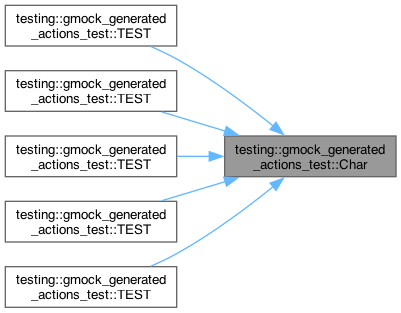
◆ CharPtr()
|
inline |
Definition at line 165 of file gmock-generated-actions_test.cc.
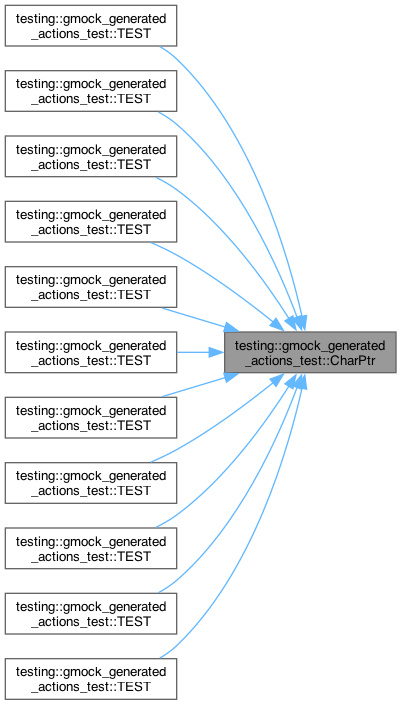
◆ Concat() [1/2]
| ConcatImplActionP3< std::string, T1, T2 > testing::gmock_generated_actions_test::Concat | ( | const std::string & | a, |
| T1 | b, | ||
| T2 | c ) |
Definition at line 905 of file gmock-generated-actions_test.cc.

◆ Concat() [2/2]
| ConcatImplActionP3< T1, int, T2 > testing::gmock_generated_actions_test::Concat | ( | T1 | a, |
| int | b, | ||
| T2 | c ) |
Definition at line 924 of file gmock-generated-actions_test.cc.
◆ Concat10()
| std::string testing::gmock_generated_actions_test::Concat10 | ( | const char * | s1, |
| const char * | s2, | ||
| const char * | s3, | ||
| const char * | s4, | ||
| const char * | s5, | ||
| const char * | s6, | ||
| const char * | s7, | ||
| const char * | s8, | ||
| const char * | s9, | ||
| const char * | s10 ) |
Definition at line 156 of file gmock-generated-actions_test.cc.

◆ Concat4()
| std::string testing::gmock_generated_actions_test::Concat4 | ( | const char * | s1, |
| const char * | s2, | ||
| const char * | s3, | ||
| const char * | s4 ) |
Definition at line 105 of file gmock-generated-actions_test.cc.

◆ Concat5()
| std::string testing::gmock_generated_actions_test::Concat5 | ( | const char * | s1, |
| const char * | s2, | ||
| const char * | s3, | ||
| const char * | s4, | ||
| const char * | s5 ) |
Definition at line 118 of file gmock-generated-actions_test.cc.

◆ Concat6()
| std::string testing::gmock_generated_actions_test::Concat6 | ( | const char * | s1, |
| const char * | s2, | ||
| const char * | s3, | ||
| const char * | s4, | ||
| const char * | s5, | ||
| const char * | s6 ) |
Definition at line 133 of file gmock-generated-actions_test.cc.

◆ Concat7()
| std::string testing::gmock_generated_actions_test::Concat7 | ( | const char * | s1, |
| const char * | s2, | ||
| const char * | s3, | ||
| const char * | s4, | ||
| const char * | s5, | ||
| const char * | s6, | ||
| const char * | s7 ) |
Definition at line 138 of file gmock-generated-actions_test.cc.

◆ Concat8()
| std::string testing::gmock_generated_actions_test::Concat8 | ( | const char * | s1, |
| const char * | s2, | ||
| const char * | s3, | ||
| const char * | s4, | ||
| const char * | s5, | ||
| const char * | s6, | ||
| const char * | s7, | ||
| const char * | s8 ) |
Definition at line 144 of file gmock-generated-actions_test.cc.

◆ Concat9()
| std::string testing::gmock_generated_actions_test::Concat9 | ( | const char * | s1, |
| const char * | s2, | ||
| const char * | s3, | ||
| const char * | s4, | ||
| const char * | s5, | ||
| const char * | s6, | ||
| const char * | s7, | ||
| const char * | s8, | ||
| const char * | s9 ) |
Definition at line 150 of file gmock-generated-actions_test.cc.

◆ Dummy()
| int testing::gmock_generated_actions_test::Dummy | ( | bool | flag | ) |
Definition at line 656 of file gmock-generated-actions_test.cc.

◆ Nullary()
| int testing::gmock_generated_actions_test::Nullary | ( | ) |
Definition at line 71 of file gmock-generated-actions_test.cc.

◆ Plus1()
| const char * testing::gmock_generated_actions_test::Plus1 | ( | const char * | s | ) |
Definition at line 82 of file gmock-generated-actions_test.cc.

◆ ReferencesGlobalDouble()
| bool testing::gmock_generated_actions_test::ReferencesGlobalDouble | ( | const double & | x | ) |
Definition at line 87 of file gmock-generated-actions_test.cc.

◆ Short()
|
inline |
Definition at line 67 of file gmock-generated-actions_test.cc.
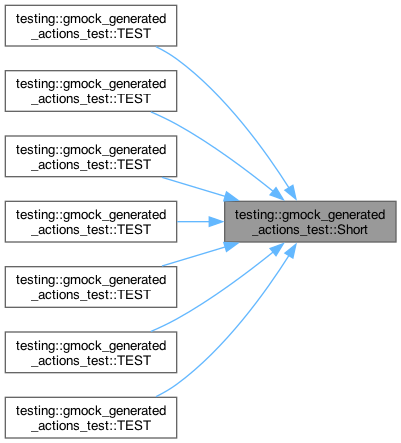
◆ SumOf4()
| int testing::gmock_generated_actions_test::SumOf4 | ( | int | a, |
| int | b, | ||
| int | c, | ||
| int | d ) |
Definition at line 103 of file gmock-generated-actions_test.cc.

◆ SumOf5()
| int testing::gmock_generated_actions_test::SumOf5 | ( | int | a, |
| int | b, | ||
| int | c, | ||
| int | d, | ||
| int | e ) |
Definition at line 110 of file gmock-generated-actions_test.cc.

◆ SumOf6()
| int testing::gmock_generated_actions_test::SumOf6 | ( | int | a, |
| int | b, | ||
| int | c, | ||
| int | d, | ||
| int | e, | ||
| int | f ) |
Definition at line 123 of file gmock-generated-actions_test.cc.

◆ Ternary()
| int testing::gmock_generated_actions_test::Ternary | ( | int | x, |
| char | y, | ||
| short | z ) |
Definition at line 99 of file gmock-generated-actions_test.cc.
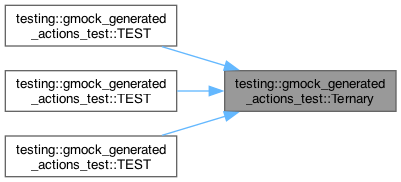
◆ TEST() [1/77]
| testing::gmock_generated_actions_test::TEST | ( | ActionMacroTest | , |
| CanDefineOverloadedActions | ) |
Definition at line 774 of file gmock-generated-actions_test.cc.

◆ TEST() [2/77]
| testing::gmock_generated_actions_test::TEST | ( | ActionMacroTest | , |
| CanReferenceArgumentTuple | ) |
Definition at line 648 of file gmock-generated-actions_test.cc.

◆ TEST() [3/77]
| testing::gmock_generated_actions_test::TEST | ( | ActionMacroTest | , |
| CanReferenceArgumentType | ) |
Definition at line 633 of file gmock-generated-actions_test.cc.

◆ TEST() [4/77]
| testing::gmock_generated_actions_test::TEST | ( | ActionMacroTest | , |
| CanReferenceMockFunctionReturnType | ) |
◆ TEST() [5/77]
| testing::gmock_generated_actions_test::TEST | ( | ActionMacroTest | , |
| CanReferenceMockFunctionType | ) |
◆ TEST() [6/77]
| testing::gmock_generated_actions_test::TEST | ( | ActionMacroTest | , |
| WorksForConstReferenceArg | ) |
◆ TEST() [7/77]
| testing::gmock_generated_actions_test::TEST | ( | ActionMacroTest | , |
| WorksForDifferentArgumentNumbers | ) |
Definition at line 722 of file gmock-generated-actions_test.cc.

◆ TEST() [8/77]
| testing::gmock_generated_actions_test::TEST | ( | ActionMacroTest | , |
| WorksForNonConstReferenceArg | ) |
◆ TEST() [9/77]
| testing::gmock_generated_actions_test::TEST | ( | ActionMacroTest | , |
| WorksInNamespace | ) |
Definition at line 713 of file gmock-generated-actions_test.cc.

◆ TEST() [10/77]
| testing::gmock_generated_actions_test::TEST | ( | ActionMacroTest | , |
| WorksWhenNotReferencingArguments | ) |
Definition at line 607 of file gmock-generated-actions_test.cc.

◆ TEST() [11/77]
| testing::gmock_generated_actions_test::TEST | ( | ActionMacroTest | , |
| WorksWhenReturningVoid | ) |
Definition at line 618 of file gmock-generated-actions_test.cc.

◆ TEST() [12/77]
| testing::gmock_generated_actions_test::TEST | ( | ActionPMacroTest | , |
| CanReferenceArgumentAndParameterTypes | ) |
◆ TEST() [13/77]
| testing::gmock_generated_actions_test::TEST | ( | ActionPMacroTest | , |
| DefinesParameterizedAction | ) |
Definition at line 734 of file gmock-generated-actions_test.cc.

◆ TEST() [14/77]
| testing::gmock_generated_actions_test::TEST | ( | ActionPMacroTest | , |
| WorksInCompatibleMockFunction | ) |
Definition at line 754 of file gmock-generated-actions_test.cc.

◆ TEST() [15/77]
| testing::gmock_generated_actions_test::TEST | ( | ActionPnMacroTest | , |
| CanExplicitlyInstantiateWithReferenceTypes | ) |
Definition at line 989 of file gmock-generated-actions_test.cc.

◆ TEST() [16/77]
| testing::gmock_generated_actions_test::TEST | ( | ActionPnMacroTest | , |
| CanPartiallyRestrictParameterTypes | ) |
Definition at line 928 of file gmock-generated-actions_test.cc.

◆ TEST() [17/77]
| testing::gmock_generated_actions_test::TEST | ( | ActionPnMacroTest | , |
| SimpleTypePromotion | ) |
Definition at line 875 of file gmock-generated-actions_test.cc.

◆ TEST() [18/77]
| testing::gmock_generated_actions_test::TEST | ( | ActionPnMacroTest | , |
| TypesAreCorrect | ) |
Definition at line 942 of file gmock-generated-actions_test.cc.
◆ TEST() [19/77]
| testing::gmock_generated_actions_test::TEST | ( | ActionPnMacroTest | , |
| WorksFor10Parameters | ) |
Definition at line 860 of file gmock-generated-actions_test.cc.

◆ TEST() [20/77]
| testing::gmock_generated_actions_test::TEST | ( | ActionPnMacroTest | , |
| WorksFor3Parameters | ) |
Definition at line 794 of file gmock-generated-actions_test.cc.

◆ TEST() [21/77]
| testing::gmock_generated_actions_test::TEST | ( | ActionPnMacroTest | , |
| WorksFor4Parameters | ) |
Definition at line 806 of file gmock-generated-actions_test.cc.

◆ TEST() [22/77]
| testing::gmock_generated_actions_test::TEST | ( | ActionPnMacroTest | , |
| WorksFor5Parameters | ) |
Definition at line 813 of file gmock-generated-actions_test.cc.

◆ TEST() [23/77]
| testing::gmock_generated_actions_test::TEST | ( | ActionPnMacroTest | , |
| WorksFor6Parameters | ) |
Definition at line 822 of file gmock-generated-actions_test.cc.

◆ TEST() [24/77]
| testing::gmock_generated_actions_test::TEST | ( | ActionPnMacroTest | , |
| WorksFor7Parameters | ) |
Definition at line 831 of file gmock-generated-actions_test.cc.

◆ TEST() [25/77]
| testing::gmock_generated_actions_test::TEST | ( | ActionPnMacroTest | , |
| WorksFor8Parameters | ) |
Definition at line 840 of file gmock-generated-actions_test.cc.

◆ TEST() [26/77]
| testing::gmock_generated_actions_test::TEST | ( | ActionPnMacroTest | , |
| WorksFor9Parameters | ) |
Definition at line 849 of file gmock-generated-actions_test.cc.

◆ TEST() [27/77]
| testing::gmock_generated_actions_test::TEST | ( | ActionTemplateTest | , |
| CanBeOverloadedOnNumberOfValueParameters | ) |
Definition at line 1212 of file gmock-generated-actions_test.cc.

◆ TEST() [28/77]
| testing::gmock_generated_actions_test::TEST | ( | ActionTemplateTest | , |
| WorksFor10TemplateParameters | ) |
Definition at line 1165 of file gmock-generated-actions_test.cc.

◆ TEST() [29/77]
| testing::gmock_generated_actions_test::TEST | ( | ActionTemplateTest | , |
| WorksFor10ValueParameters | ) |
◆ TEST() [30/77]
| testing::gmock_generated_actions_test::TEST | ( | ActionTemplateTest | , |
| WorksForIntegralTemplateParams | ) |
Definition at line 1116 of file gmock-generated-actions_test.cc.
◆ TEST() [31/77]
| testing::gmock_generated_actions_test::TEST | ( | ActionTemplateTest | , |
| WorksForTemplateTemplateParameters | ) |
Definition at line 1133 of file gmock-generated-actions_test.cc.
◆ TEST() [32/77]
| testing::gmock_generated_actions_test::TEST | ( | ActionTemplateTest | , |
| WorksWithoutValueParam | ) |
◆ TEST() [33/77]
| testing::gmock_generated_actions_test::TEST | ( | ActionTemplateTest | , |
| WorksWithValueParams | ) |
◆ TEST() [34/77]
| testing::gmock_generated_actions_test::TEST | ( | DoAllTest | , |
| EightActions | ) |
Definition at line 513 of file gmock-generated-actions_test.cc.

◆ TEST() [35/77]
| testing::gmock_generated_actions_test::TEST | ( | DoAllTest | , |
| FiveActions | ) |
Definition at line 456 of file gmock-generated-actions_test.cc.

◆ TEST() [36/77]
| testing::gmock_generated_actions_test::TEST | ( | DoAllTest | , |
| FourActions | ) |
Definition at line 441 of file gmock-generated-actions_test.cc.

◆ TEST() [37/77]
| testing::gmock_generated_actions_test::TEST | ( | DoAllTest | , |
| NineActions | ) |
Definition at line 537 of file gmock-generated-actions_test.cc.

◆ TEST() [38/77]
| testing::gmock_generated_actions_test::TEST | ( | DoAllTest | , |
| SevenActions | ) |
Definition at line 492 of file gmock-generated-actions_test.cc.

◆ TEST() [39/77]
| testing::gmock_generated_actions_test::TEST | ( | DoAllTest | , |
| SixActions | ) |
Definition at line 473 of file gmock-generated-actions_test.cc.

◆ TEST() [40/77]
| testing::gmock_generated_actions_test::TEST | ( | DoAllTest | , |
| TenActions | ) |
Definition at line 563 of file gmock-generated-actions_test.cc.

◆ TEST() [41/77]
| testing::gmock_generated_actions_test::TEST | ( | DoAllTest | , |
| ThreeActions | ) |
Definition at line 430 of file gmock-generated-actions_test.cc.

◆ TEST() [42/77]
| testing::gmock_generated_actions_test::TEST | ( | DoAllTest | , |
| TwoActions | ) |
◆ TEST() [43/77]
| testing::gmock_generated_actions_test::TEST | ( | InvokeArgumentTest | , |
| ByConstReferenceFunction | ) |
Definition at line 261 of file gmock-generated-actions_test.cc.

◆ TEST() [44/77]
| testing::gmock_generated_actions_test::TEST | ( | InvokeArgumentTest | , |
| ByExplicitConstReferenceFunction | ) |
Definition at line 272 of file gmock-generated-actions_test.cc.

◆ TEST() [45/77]
| testing::gmock_generated_actions_test::TEST | ( | InvokeArgumentTest | , |
| ByPointerFunction | ) |
Definition at line 246 of file gmock-generated-actions_test.cc.

◆ TEST() [46/77]
| testing::gmock_generated_actions_test::TEST | ( | InvokeArgumentTest | , |
| Function0 | ) |
◆ TEST() [47/77]
| testing::gmock_generated_actions_test::TEST | ( | InvokeArgumentTest | , |
| Function10 | ) |
Definition at line 237 of file gmock-generated-actions_test.cc.

◆ TEST() [48/77]
| testing::gmock_generated_actions_test::TEST | ( | InvokeArgumentTest | , |
| Function5 | ) |
◆ TEST() [49/77]
| testing::gmock_generated_actions_test::TEST | ( | InvokeArgumentTest | , |
| Function6 | ) |
◆ TEST() [50/77]
| testing::gmock_generated_actions_test::TEST | ( | InvokeArgumentTest | , |
| Function7 | ) |
Definition at line 210 of file gmock-generated-actions_test.cc.

◆ TEST() [51/77]
| testing::gmock_generated_actions_test::TEST | ( | InvokeArgumentTest | , |
| Function8 | ) |
Definition at line 219 of file gmock-generated-actions_test.cc.

◆ TEST() [52/77]
| testing::gmock_generated_actions_test::TEST | ( | InvokeArgumentTest | , |
| Function9 | ) |
Definition at line 228 of file gmock-generated-actions_test.cc.

◆ TEST() [53/77]
| testing::gmock_generated_actions_test::TEST | ( | InvokeArgumentTest | , |
| FunctionWithCStringLiteral | ) |
Definition at line 254 of file gmock-generated-actions_test.cc.

◆ TEST() [54/77]
| testing::gmock_generated_actions_test::TEST | ( | InvokeArgumentTest | , |
| Functor1 | ) |
Definition at line 176 of file gmock-generated-actions_test.cc.
◆ TEST() [55/77]
| testing::gmock_generated_actions_test::TEST | ( | InvokeArgumentTest | , |
| Functor5 | ) |
Definition at line 189 of file gmock-generated-actions_test.cc.
◆ TEST() [56/77]
| testing::gmock_generated_actions_test::TEST | ( | InvokeArgumentTest | , |
| Functor6 | ) |
Definition at line 203 of file gmock-generated-actions_test.cc.
◆ TEST() [57/77]
| testing::gmock_generated_actions_test::TEST | ( | ReturnNewTest | , |
| ConstructorThatTakes10Arguments | ) |
Definition at line 1063 of file gmock-generated-actions_test.cc.
◆ TEST() [58/77]
| testing::gmock_generated_actions_test::TEST | ( | ReturnNewTest | , |
| NoArgs | ) |
Definition at line 1016 of file gmock-generated-actions_test.cc.
◆ TEST() [59/77]
| testing::gmock_generated_actions_test::TEST | ( | ReturnNewTest | , |
| Unary | ) |
Definition at line 1030 of file gmock-generated-actions_test.cc.
◆ TEST() [60/77]
| testing::gmock_generated_actions_test::TEST | ( | ReturnNewTest | , |
| UnaryWorksWhenMockMethodHasArgs | ) |
Definition at line 1037 of file gmock-generated-actions_test.cc.
◆ TEST() [61/77]
| testing::gmock_generated_actions_test::TEST | ( | ReturnNewTest | , |
| UnaryWorksWhenMockMethodReturnsPointerToConst | ) |
Definition at line 1045 of file gmock-generated-actions_test.cc.
◆ TEST() [62/77]
| testing::gmock_generated_actions_test::TEST | ( | WithArgsTest | , |
| ArgsOfCompatibleTypes | ) |
Definition at line 406 of file gmock-generated-actions_test.cc.
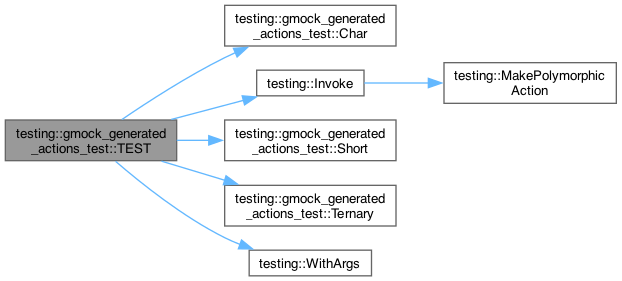
◆ TEST() [63/77]
| testing::gmock_generated_actions_test::TEST | ( | WithArgsTest | , |
| EightArgs | ) |
Definition at line 342 of file gmock-generated-actions_test.cc.
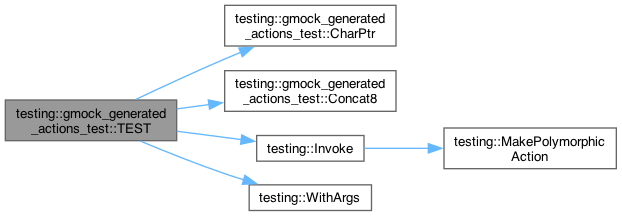
◆ TEST() [64/77]
| testing::gmock_generated_actions_test::TEST | ( | WithArgsTest | , |
| FiveArgs | ) |
Definition at line 315 of file gmock-generated-actions_test.cc.
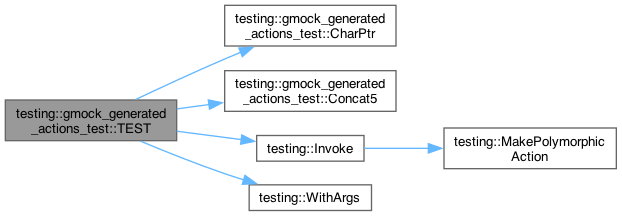
◆ TEST() [65/77]
| testing::gmock_generated_actions_test::TEST | ( | WithArgsTest | , |
| FourArgs | ) |
Definition at line 306 of file gmock-generated-actions_test.cc.
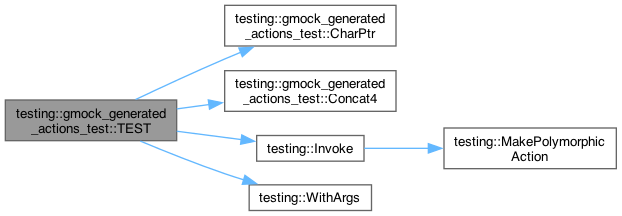
◆ TEST() [66/77]
| testing::gmock_generated_actions_test::TEST | ( | WithArgsTest | , |
| Identity | ) |
◆ TEST() [67/77]
| testing::gmock_generated_actions_test::TEST | ( | WithArgsTest | , |
| NineArgs | ) |
Definition at line 351 of file gmock-generated-actions_test.cc.
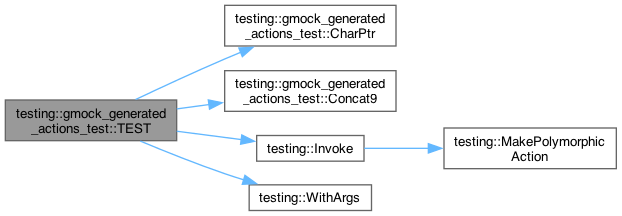
◆ TEST() [68/77]
| testing::gmock_generated_actions_test::TEST | ( | WithArgsTest | , |
| NonInvokeAction | ) |
Definition at line 376 of file gmock-generated-actions_test.cc.

◆ TEST() [69/77]
| testing::gmock_generated_actions_test::TEST | ( | WithArgsTest | , |
| OneArg | ) |
Definition at line 284 of file gmock-generated-actions_test.cc.

◆ TEST() [70/77]
| testing::gmock_generated_actions_test::TEST | ( | WithArgsTest | , |
| RepeatedArguments | ) |
◆ TEST() [71/77]
| testing::gmock_generated_actions_test::TEST | ( | WithArgsTest | , |
| ReversedArgumentOrder | ) |
Definition at line 398 of file gmock-generated-actions_test.cc.

◆ TEST() [72/77]
| testing::gmock_generated_actions_test::TEST | ( | WithArgsTest | , |
| SevenArgs | ) |
Definition at line 333 of file gmock-generated-actions_test.cc.
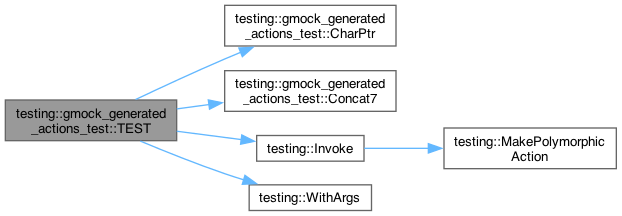
◆ TEST() [73/77]
| testing::gmock_generated_actions_test::TEST | ( | WithArgsTest | , |
| SixArgs | ) |
Definition at line 325 of file gmock-generated-actions_test.cc.
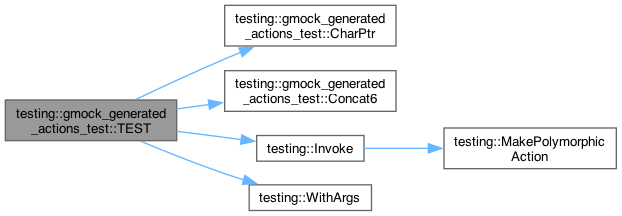
◆ TEST() [74/77]
| testing::gmock_generated_actions_test::TEST | ( | WithArgsTest | , |
| TenArgs | ) |
Definition at line 360 of file gmock-generated-actions_test.cc.
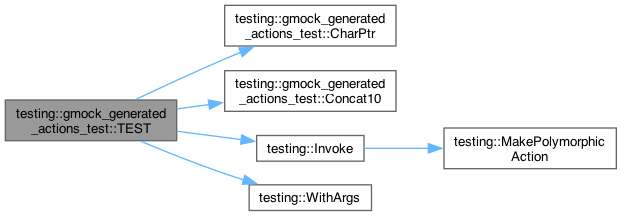
◆ TEST() [75/77]
| testing::gmock_generated_actions_test::TEST | ( | WithArgsTest | , |
| ThreeArgs | ) |
◆ TEST() [76/77]
| testing::gmock_generated_actions_test::TEST | ( | WithArgsTest | , |
| TwoArgs | ) |
Definition at line 291 of file gmock-generated-actions_test.cc.

◆ TEST() [77/77]
| testing::gmock_generated_actions_test::TEST | ( | WithArgsTest | , |
| VoidAction | ) |
Definition at line 413 of file gmock-generated-actions_test.cc.

◆ Unary()
| bool testing::gmock_generated_actions_test::Unary | ( | int | x | ) |
Definition at line 80 of file gmock-generated-actions_test.cc.
◆ VoidBinary()
| void testing::gmock_generated_actions_test::VoidBinary | ( | int | , |
| char | ) |
Definition at line 97 of file gmock-generated-actions_test.cc.

◆ VoidTernary()
| void testing::gmock_generated_actions_test::VoidTernary | ( | int | , |
| char | , | ||
| bool | ) |
Definition at line 101 of file gmock-generated-actions_test.cc.
Variable Documentation
◆ g_done
| bool testing::gmock_generated_actions_test::g_done = false |
Definition at line 78 of file gmock-generated-actions_test.cc.
◆ g_double
| const double testing::gmock_generated_actions_test::g_double = 0 |
Definition at line 86 of file gmock-generated-actions_test.cc.







